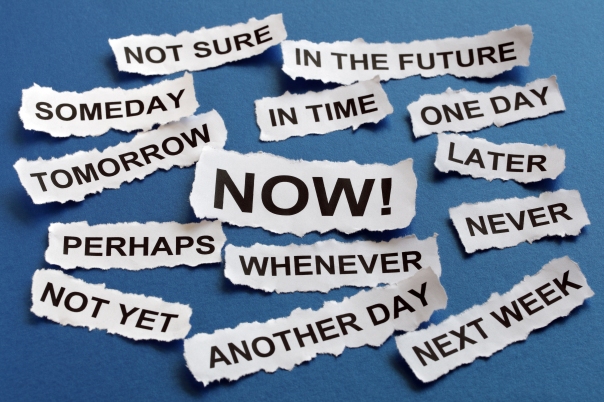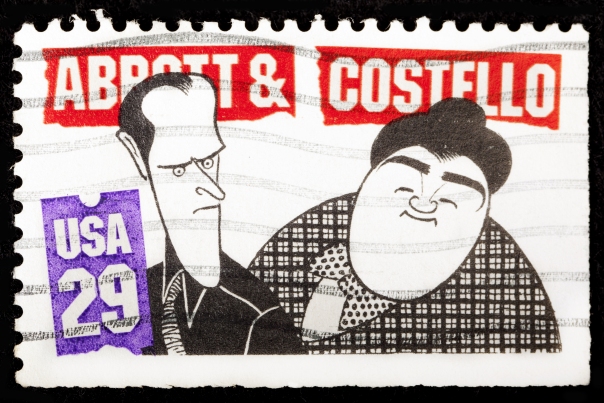“The business of remembering what you did that day, or what you might want to do the next, I think, is essential for creating an overview of your life – that overview is what fuels plan-making and that ties in deeply with identity.”

In case you missed it, this comment was made about my last post by Jabberwalk, who writes with great insight and honesty at her own site Caregiving in the Forest.I can’t stop mulling over the implications.
Time is the trickiest part of life for Ralph. Almost the first thing he asks each morning is what day of the week it is. Sometimes he remembers what he did or parts of what he did yesterday, sometimes he doesn’t. Often he misremembers. He doesn’t like the confusion his lousy short-term memory breeds, but he lives with it by asking for a rehash over and over hoping for clarity that seldom comes.
We all fear the loss of short-term memory, but the problem of future memory is in some ways more troubling. When Ralph looks forward to what comes next, what he seems to see is an anxiety-producing obstacle course. Since he can’t hold on to the facts of place and time, he becomes increasingly anxious each time he asks again Where? but mostly When? The issue for me becomes how much information does he need, how much is a burden.
Not only do I make the scheduling decisions, but I also end up structuring what he thinks about that schedule, and therefore what he thinks about period. In other words, I am taking away or at least shrinking his overview.
His sense of identity has certainly shrunk. Yes, he is an increasingly passionate dog lover because dogs demand so little and remember on their own. And he remains a husband, not an equal partner perhaps but genuinely grateful to his wife for filling in the blanks. He is still a father too, although his memory of the kids’ childhoods is sketchy and he keeps up less and less with their adult lives because he finds tracking the details so difficult. He was glad to let go of his professional identity and hand me that responsibility early on. While he can be charming in social encounters, his interest in friendship and being a friend is limited by his difficulty remembering who people are, their names of course but more importantly, their connection to him. While still capable of moments of remarkable perception, he is no longer interested in being an intellectual or armchair philosopher because it requires remembering a train of thought.
I remember lots of trains of thought. I carry around layers of overview based on the different roles I play—wife, writer, friend, woman, businessperson, spiritual seeker, reader, political thinker, mother (Note that caregiver is not on this quickly written list—a Freudian slip I just noticed myself).
These roles operate within and are influenced by the various ways I frame my time. There is the constant background hum of long-term, generalized plans still under construction (i.e. How much longer until we need to downsize? What are my options if/when needs professional care?). More immediately, there is the weekly erasable-board calendar that Ralph and I live by day-to-day; there is the monthly wall calendar as well as the one on my phone. And there is the semi-conscious minute-by-minute and hourly tracking most of us fold into our routine (unless we are on the Alzheimer’s continuum and struggle to remember whether we ate lunch already) without much conscious thought.
But what has always been almost second nature, like making coffee as soon as I get up in the morning, is getting more difficult. Lately I have trouble both keeping my plans organized and keeping a hold on my sense of self within those plans, largely because of the important role-identity I just caught myself forgetting to include above. Caregiver, leads to another identity: AliceasRalph.
Keeping Ralph’s life organized and reminding him what he is doing on a given day means I also remind him why and how he feels, which means I make an effort to get into his head to understand his mindset. Thus is born AliceasRalph, who often ends up as confused as he is by his confusion about whatever I am trying to explain. Our weirdly opaque discussions can sound like the old WHO’S ON FIRST comedy routine.
Ralph’s overview of his life, if not lost entirely, is definitely tangled. And because I am both Alice and AliceasRalph, my overview is pretty tangled too. Not hopelessly, but moving forward requires vigilance as I ceaselessly work to untangle the delicate filaments without breaking them.

“Who’s on first?…..” is such a funny routine and a favorite of my husband’s. Wouldn’t be so funny living it as reality. Good you can manage a sense of humor about some of it at times as likely that helps you retain your sanity — or if you’ve lost it maybe you can’t tell anyway. 😉
LikeLike
Yes, humor is essential, in the face of all forms of loss and difficulty. I want to say how much I appreciate the lines you quoted in your recent post and that I am repeating here for others to appreciate as well. “Elections belong to the
people. It is their decision. If they decide to turn their back on the fire and burn their behinds, then they will just have to sit
on their blisters.” —Abraham Lincoln Thanks for me making me chuckle when I least felt like it.
LikeLike
Love that quote! Another great post; thanks Alice. My husband does not have any perception of his cognitive deficits. A blessing, in many ways for him. His world has become very small, but he has no perception that this is a change from how he used to be. I am struggling with the 24/7 high alert state that comes from being the caregiver. It is a part of my consciousness no matter what I am doing. And at the same time, on a lesser plane, I am still a part time caregiver for my mom.
I like your idea of a white board. I might try that, to see if it helps with the anxiety associated with “What are we going to do today???!!!”
LikeLike
That high alert state is exhausting, isn’t it. And I went through a few years of dealing with Ralph’s early post-diagnosis when he was particularly anxious pre-namenda and at the same time was dealing my mother who lived with us in her nineties so I totally empathize with your split caregiving.
I like the white board, but be aware Ralph really can’t remember to use it so it is totally for me to say, “See, it’s on the board.”
Thanks for writing.
LikeLike
Thanks for the citation, Alice! It sure helps to know that some of the words we write are helpful to others.
Your situation is so much like mine in many ways, and it is great to have companions along the way!
LikeLiked by 1 person
We really do have many parallels in our lives…always learn from you.
LikeLike
Thank you for this post. I struggle some days to keep on top of what I’m doing at work and at home, and what my kids and husband are doing too, but at least I can rely on them to remember some of them. I can only imagine how you are trying to manage for both of you. Sending you lots of love x x
LikeLiked by 1 person
Thanks so much for your kind words
LikeLiked by 1 person